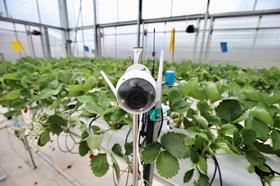
Strawberries grown using the latest agricultural technology have outperformed traditional methods in a competition run by Chinese e-commerce platform Pinduoduo.
The Smart Agriculture Competition, co-organised by Pinduoduo and the China Agricultural University, took place over four months and pitted data scientists against strawberry growers with the Food and Agriculture Organization of the United Nations used as a technical adviser.
The four technology teams, which employed data analysis, intelligent sensors and greenhouse automation, produced an average of 6.86kg of strawberries, or 196 per cent more than the 2.32kg average for the three teams of traditional growers.
The technologists also outperformed growers in terms of return on investment by an average of 75.5 per cent.
CyberFarmer.HortiGraph, a team made up mostly of researchers from the China Agricultural University and National Agriculture Intelligence Equipment Engineering Technical Research Centre, placed first in the competition.
The competition is part of Pinduoduo’s push into smart agriculture and its broader goal of helping China realise the full economic potential of its agriculture resources. It will now explore promoting the technology developed by the teams in the competition to working farms in China.
Andre Zhu, senior vice president of Pinduoduo, said the company has identified raising the level of digitisation across the value chain, from production to the transportation and sale of food, as one of the first steps in improving productivity.
“Technology is the force multiplier that helps both the people who grow the food and the people who eat it,” said Zhu. “Investing in agriculture benefits the greatest number of people. We are happy to play the role of matchmaker and enabler.”
CyberFarmer.HortiGraph, the winning team, employed knowledge graph technology to collect grower experience, historical cultivation data, and strawberry image recognition.
This was then combined with water, fertiliser and greenhouse climate models to create an intelligent decision strategy for growing strawberries.
Organisers noted the technology teams had the advantage of being able to control temperature and humidity through greenhouse automation and thus were more precise at controlling the use of water and nutrients. The traditional farmers had to achieve the same tasks by hand and experience.
Cheng Biao, the leader of the Zhi Duo Mei team, said the competition showed what could be achieved when integrating both approaches.
'In agriculture, traditional farmers distrust data scientists, thinking they are flashy yet useless; data scientists also look down on farmers, thinking they are too old-fashioned,' said Cheng.
'Through this competition, we realized the importance of combining both sides' advantages and working together.'
The Zhi Duo Mei team has taken steps to commercialise its research following the competition. It set up a company of the same name to provide its strawberry-planting technology to farming cooperatives after receiving numerous inquiries during the competition.



